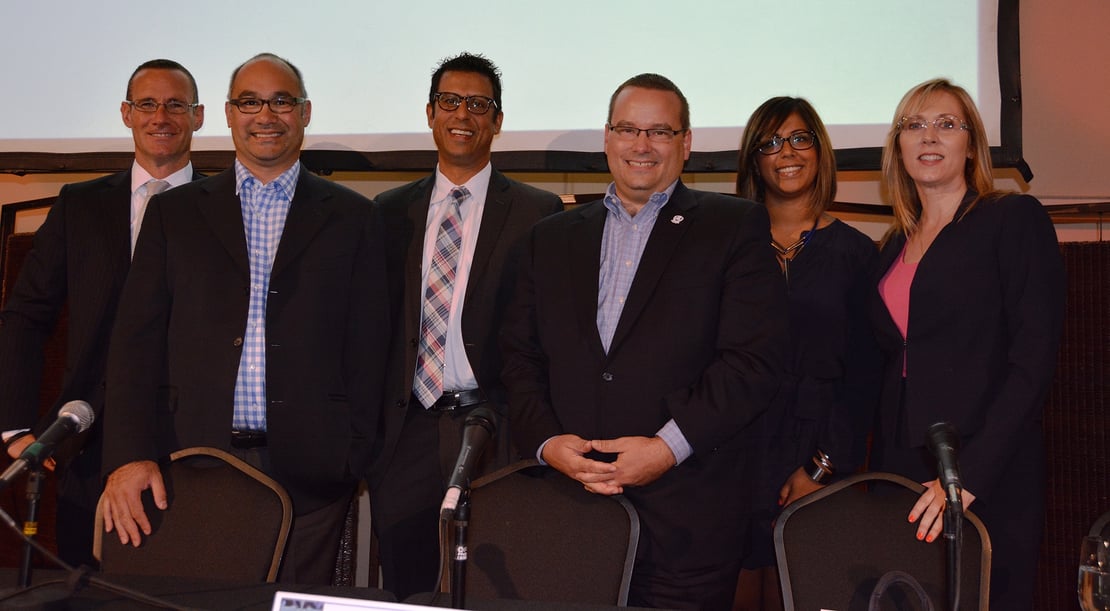 Panelists from left to right: Scott Gregarson, CEO ValleyCare; Jason Paragos, Deputy Director at the Lawrence Livermore National Laboratory; Rahul Parikh, M.D.; Enakshi Singh, Product Manager at SAP; Lynn Fischer, CEO Title21 Software. Photo courtesy of Jeanie Haigh, Livermore Chamber of Commerce
Panelists from left to right: Scott Gregarson, CEO ValleyCare; Jason Paragos, Deputy Director at the Lawrence Livermore National Laboratory; Rahul Parikh, M.D.; Enakshi Singh, Product Manager at SAP; Lynn Fischer, CEO Title21 Software. Photo courtesy of Jeanie Haigh, Livermore Chamber of Commerce
The Tri-Valley area is gaining recognition as a technology hub – recognition well-earned according to the panelists and moderators of the Tri-Valley Medical Innovation Forum, held on July 23rd in Livermore, CA. The annual event, in its 6th year, is hosted by Innovation Tri-Valley, a business leadership association which promotes a vibrant business community and healthy economy for the Tri-Valley area, comprising of Livermore, Pleasanton, San Ramon, Dublin and Danville. Moderator Matt Gardner, Senior Advisor to the Bay Area Council, keenly introduced the overarching theme of the discussion by asking panelists their favorite work by Leonardo Da Vinci – setting up the analogy that we are going through a Renaissance in healthcare technology and the Tri-Valley is poised to be Florence.
The event shined a light on the multitude of innovative companies based in the Tri-Valley area that are making a powerful impact in healthcare. The two panel discussions at the event promoted the great resources of the Tri-Valley, including two national laboratories, as well as fostered important discussions on the advancements we still need to strive for when it comes to the relationship of healthcare and technology. Title21 Software CEO, Lynn Fischer, served as a panelist on the discussion which concentrated on paving the path to high quality medical wellness and care. Other panelists, all from companies in the Tri-Valley area, included Scott Gregorson, CEO of Valley Care, Dr. Rahul Parikh, a practicing Physician at Kaiser Permanente, Enakshi Singh, Product Manager, SAP HANA Platform for Healthcare, and Jason Paragos, Deputy Director at the Lawrence Livermore National Laboratory.
Panelists’ conversation touched on the aspirations of technology throughout healthcare– of greater efficiency, reduced costs, and an overall holistic system to ultimately improve patient care. Some panelists shared the challenges they are facing when moving towards a paperless, technology-based system – user-adoption, disruptive technology and peoples’ resistance to change. Dr. Parikh expressed, “I’m hearing tremendous enthusiasm and ideas around technology. Again – what I come back to is how does technology directly impact the delivery of care? I’m enthusiastic that we are going to find solutions that are going to have an incredible impact. I think the trick is […] how do you use that technology, that bright shiny stuff, to actually increase that efficiency and bring down the cost for employer, individual and others?”
In a healthcare landscape filled with organizations federally urged to adopt electronic health record systems, the need to seamlessly implement electronic processes without disrupting workflow and, in turn, actually realize cost-efficiency as a result of automation, is critical. Title21 Software, CEO, Lynn Fischer gave insight into why many healthcare organizations are struggling through the electronic transition. In summation, it takes flexible technology.
“Why hasn’t there been greater change faster? One of the reasons is the regulations and being able to adapt within those regulations. It takes very specialized technology to be able to do that”, Fischer explained.“Quality and cost-efficiency don’t have to be at odds. You can achieve them, but you need flexible technology to be able to achieve them. What we have found in our experience is too many software and technology companies basically try to mandate what they want the hospital lab or the med device company to do –“this is the way our software does it and this is the way you have to do it” – and we have found with flexible, highly configurable technology –which means it is basically all configured on the front end – we are able to map and achieve and streamline their processes very quickly and efficiently.”
Compliance to evolving regulations is just one of the challenges healthcare organizations not only struggle with, but desperately need technology to help them achieve. When solutions-providers deliver technology to healthcare organizations that forces them to automate their business in rigid, pre-defined ways, user-adoption suffers and instead of gaining efficiency, the technology is seen as a disruption. Ms. Fischer explained, “There is a big challenge for technology companies to be a lot more agile than they are to serve the specific customer needs. The regulations may be the same but the interpretations of the regulations and how each lab conducts their business or each hospital conducts their business is vastly different. That is one of the things we’ve found at Title21 Software. It’s been our configurability and our ability to basically serve the particular customer requirements to automate all their workflows and all their documentations the way they do business. Really our major competitor is not other software companies – it’s actually peoples’ unwillingness to change and paper – their love of paper.”
.jpg?width=1110&height=692&name=Innovation%20Forum%202014%20(117).jpg)





